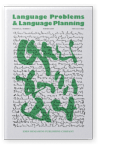Vol. 30:2 (2006) ► pp.173–192
Esperanto and Chinese anarchism in the 1920s and 1930s
Esperanto in China and among the Chinese diaspora was for long periods closely linked with anarchism. This article looks at the history of the Chinese Esperanto movement after the repatriation of anarchism to China in the 1910s. It examines Esperanto’s political connections in the Chinese setting and the arguments used by its supporters to promote the language. In exploring the role played by Esperanto in interwar Chinese culture and politics, it helps to throw light on the complex relationship between language and politics in China in the first half of the twentieth century.
Cited by
Cited by 6 other publications
This list is based on CrossRef data as of 5 june 2024. Please note that it may not be complete. Sources presented here have been supplied by the respective publishers. Any errors therein should be reported to them.
